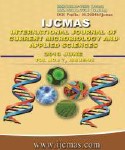


 National Academy of Agricultural Sciences (NAAS)
National Academy of Agricultural Sciences (NAAS)

|
PRINT ISSN : 2319-7692
Online ISSN : 2319-7706 Issues : 12 per year Publisher : Excellent Publishers Email : editorijcmas@gmail.com / submit@ijcmas.com Editor-in-chief: Dr.M.Prakash Index Copernicus ICV 2018: 95.39 NAAS RATING 2020: 5.38 |
Climate change has become an important area of concern to ensure food and nutritional security for growing population. In India, significant negative impacts have been implied with medium-term (2010-2039) climate change, predicted to reduce yields by 4.5 to 9 %, depending on the magnitude and distribution of warming. In the context of climate change and variability, farmers need to adapt quickly to enhance their resilience to increasing threats of climatic variability such as droughts, floods and other extreme climatic events. Concentrated efforts are required for mitigation and adaptation to reduce the vulnerability of agriculture to the adverse impacts of climate change and making it more resilient. As most of our farmers are marginal their adaptive capacity is limited, and hence, economically viable and culturally acceptable adaptation techniques need to be developed and implemented. Over the years, an array of practices and technologies have been developed by researchers towards fostering stability in agricultural production against the onslaught of seasonal variations. Adoption of such resilient practices and technologies by farmers appears to be more a necessity than an option. Practices revolving around efficient resource-use, safeguards environment, and sustaining long-term development of agriculture assume greater importance. On-farm demonstration of site-specific technologies will go a long way in enabling farmers cope with current climate variability.
 |
 |
 |
 |
 |